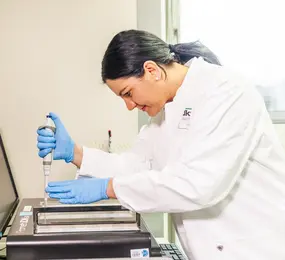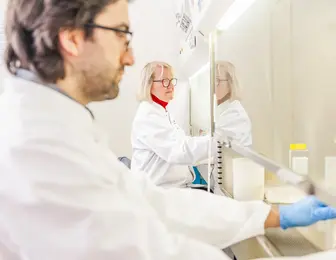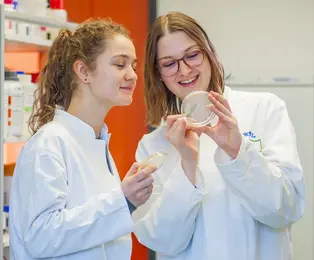Genome Instability in Tumors
- Functional and Structural Genomics
- Junior Research Group

Priv. Doz. Dr. Aurélie Ernst
Group Leader
Our goal is to elucidate how chromosome instability leads to massive genome rearrangements and to leverage chromosome instability to prevent and treat cancer.

Our Research
Cancer starts years to decades before diagnosis. Yet, early stages of cancer development are poorly understood. In particular, the precancer landscape of chromosome instability is understudied. We investigate how the instability rate of the human genome, followed by selection, determines whether cancer develops. Using spatially aware and single-cell multiome methods that we developed, we dissect essential factors that lead to cancer development via chromosome instability.
Chromosome instability is characterized by an increased accumulation of changes in chromosome number and structure. We and others have shown that 60 to 80% of human cancers show chromosome instability. Even though point mutations have been studied extensively, the majority of cancer drivers arise from instability, not from point mutations.
Instability leads to intra-tumor heterogeneity, treatment resistance, metastases and ultimately poor clinical outcome – in fact, cancer genomes that are highly unstable offer very limited treatment options. For these hard-to-treat cancers, earlier detection and earlier intervention will increase survival rates. We want to identify potential etiologies and mechanisms of chromosome instability and with this, potential applications for early diagnosis, prevention and treatment.
Unknown before the next-generation sequencing era, chromothripsis is a unique type of chromosome instability, by which a single catastrophic event generates extensive genomic rearrangements of one or a few chromosome(s). Chromothripsis is frequent in cancer and linked with poor prognosis in a number of tumor types. The research in our group aims at achieving a better understanding of how chromothripsis arises and at assessing potential implications for cancer patients. More specifically, our goals are 1) to characterize in which context chromothripsis occurs and which evolutionary dynamics chromothriptic tumors may have 2) to decipher the mechanistic basis of chromothripsis 3) to target vulnerabilities of tumor cells with chromothripsis. For this, we employ approaches encompassing single-cell genomics, functional testing in model systems and pre-clinical studies in mice.
Projects
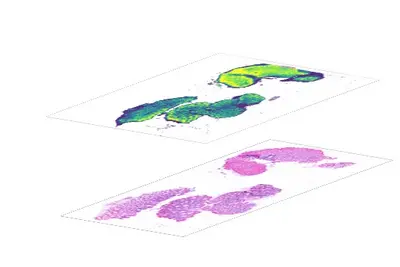
Somatic (epi)genome evolution in time and space
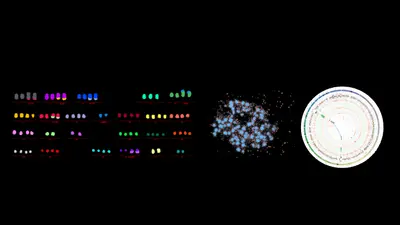
Molecular mechanisms underlying chromosome instability
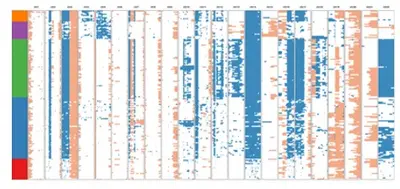
Charting the pre-cancer landscape to pioneer novel approaches to diagnose, prevent and treat unstable tumors
Team
We are a multi-disciplinary team of experimental and computational scientists passionate about genome instability in cancer development.
-

Priv. Doz. Dr. Aurélie Ernst
Group Leader
-

Frauke Devens
Research Technician
-

Greta Döking
Research Technician
-

Michaela Hergt
Research Technician
-

Jan Otonicar
PhD Student
-

Urja Parekh
PhD Student
-

George Philippos
PhD Student
-
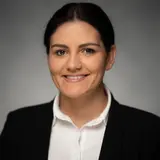
Dr. Milena Simovic-Lorenz
Postdoctoral Researcher
-

Petr Smirnov
Postdoctoral Researcher
-

Michèle Vousten
Research Technician
Selected Publications
Otoničar J, Lazareva O, Mallm JP, Simovic-Lorenz M, Philippos G, Sant P, Parekh U, Hammann L, Li A, Yildiz U, Marttinen M, Zaugg J, Noh KM, Stegle O*, Ernst A*.
*joint last and corresponding authors
Kats I, Simovic-Lorenz M, Schreiber HS, Sant P, Mallm JP, Körber V, Li A, Velmurugan P, Heuer S, Kües L, Devens F, Sill M, Jugold M, Moustafa M, Abdollahi A, Winkler F, Korshunov A, Pfister SM, Stegle O*, Ernst A*.
*joint last and corresponding authors
Smirnov P, Przybilla MJ, Simovic-Lorenz M, Parra RG, Susak H, Ratnaparkhe M, Wong JK, Körber V, Mallm JP, Philippos G, Sill M, Kolb T, Kumar R, Casiraghi N, Okonechnikov K, Ghasemi DR, Maaß KK, Pajtler KW, Jauch A, Korshunov A, Höfer T, Zapatka M, Pfister SM, Huber W, Stegle O*, Ernst A*.
*joint last and corresponding authors
Alcolea MP, Alonso-Curbelo D, Ambrogio C, Bullman S, Correia AL, Ernst A, Halbrook CJ, Kelly GL, Lund AW, Quail DF, Ruscetti M, Shema E, Stromnes IM, Tam WL.
Rausch T, Snajder R, Leger A, Simovic M, Giurgiu M, Villacorta L, Henssen AG, Fröhling S, Stegle O, Birney E, Bonder MJ*, Ernst A*, Korbel JO*
*joint last and corresponding authors
Simovic M, Bolkestein M, Moustafa M, Wong JKL, Körber V, Benedetto S, Khalid U, Schreiber HS, Jugold M, Korshunov A, Hübschmann D, Mack N, Brons S, Wei PC, Breckwoldt MO, Heiland S, Bendszus M, Jürgen D, Höfer T, Zapatka M, Kool M, Pfister SM, Abdollahi A, Ernst A.
Bolkestein M, Wong JKL, Thewes V, Körber V, Hlevnjak M, Elgaafary S, Schulze M, Kommoss FKF, Sinn HP, Anzeneder T, Hirsch S, Devens F, Schröter P, Höfer T, Schneeweiss A, Lichter P, Zapatka M, Ernst A.
Voronina N, Wong JKL, Hübschmann D, Hlevnjak M, Uhrig S, Heilig CE, Horak P, Kreutzfeldt S, Mock A, Stenzinger A, Hutter B, Fröhlich M, Brors B, Jahn A, Klink B, Gieldon L, Sieverling L, Feuerbach L, Chudasama P, Beck K, Kroiss M, Heining C, Möhrmann L, Fischer A, Schröck E, Glimm H, Zapatka M, Lichter P, Fröhling S, Ernst A.
Awards
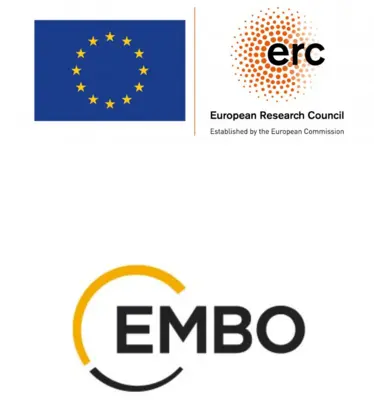
European Research Council Consolidator Grant (2025-2030)
EMBO Young Investigator Award (2024)
Open Positions
Get in touch with us

